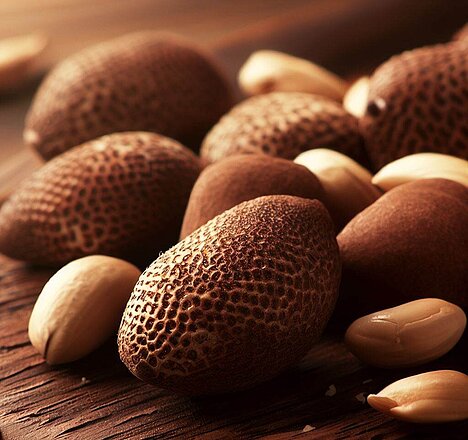Brazil nuts

What are Brazil nuts?
Brazil nuts are the seeds of the Brazil nut tree, which grows in the tropical rainforests of South America. The seeds are contained in a hard shell surrounded by a woody fruit. One fruit can weigh up to 2 kilograms and contain up to 25 seeds. Harvesting Brazil nuts is laborious and dangerous work, usually carried out by indigenous peoples.
Brazil nuts have a nutty and slightly sweet taste. They are rich in protein, fat, fiber, minerals and vitamins. Particularly noteworthy is their high content of selenium, a trace element that is important for thyroid function and the immune system.
Benefits of Brazil nuts for dogs
Brazil nuts can be healthy for dogs in moderation. They provide them with energy, aid digestion and strengthen the immune system. They can also improve skin and coat health and reduce inflammation. Selenium can also protect against some types of cancer and slow down cell ageing.
Disadvantages of Brazil nuts for dogs
Brazil nuts also have some disadvantages for dogs. Firstly, they are very high in calories and can lead to obesity if they are fed in large quantities. Secondly, they can trigger allergies or cause gastrointestinal problems. They can also contain molds that are toxic to dogs.
Another disadvantage of Brazil nuts is their high selenium content. Although selenium is essential in small amounts, it can lead to selenium poisoning in high doses. Symptoms of selenium poisoning include vomiting, diarrhea, hair loss, lethargy, cramps and liver damage.
How much Brazil nuts can a dog eat?
The amount of Brazil nuts a dog can eat depends on its size, weight and state of health. In general, however, Brazil nuts should only be given as an occasional treat. A rule of thumb is that a dog should not eat more than one Brazil nut per day.
Before you give your dog Brazil nuts, you should make sure that they are fresh and unsalted. You should also remove the shell and cut or chop the nut into small pieces. This way you avoid the risk of choking or intestinal obstruction.
Brazil nuts are a tasty and nutritious ingredient for humans, but not necessarily for dogs. While they have some health benefits for dogs, they also have some disadvantages and risks. If you want to treat your dog to a Brazil nut from time to time, make sure they are fresh, unsalted, shelled and only given in small quantities.
If you notice any signs of hypersensitivity or poisoning in your dog, you should see your vet immediately. We are not a substitute for a vet, but we try to be as accurate as possible. Every dog reacts differently and we recommend you get a second opinion or consult your vet if in doubt.
Stay healthy and take good care of your four-legged friend!😊